Nursing 44: Professional Responsibility and Accountability Report
VerifiedAdded on 2022/09/16
|64
|20031
|25
Report
AI Summary
This report is a comprehensive assessment of a nursing student's understanding and application of professional responsibility and accountability in various clinical scenarios. The student demonstrates competence in establishing therapeutic relationships with diverse patient populations, identifying and addressing patient healthcare needs, and collaborating with clients across the lifespan. The report highlights the student's critical thinking and problem-solving skills, including the use of theory-based approaches like Nightingale's Environmental Theory, and knowledge of nursing, health, and social sciences. The student showcases an understanding of patient rights, including consent, confidentiality, and self-determination. Furthermore, the assessment covers organizational culture's impact on nursing practice, appropriate delegation of tasks, literature review for assessment tools, conflict-resolution skills, therapeutic communication, and leadership skills. Through detailed examples, the report illustrates the student's ability to provide holistic, patient-centered care while adhering to ethical and professional standards. The student emphasizes the importance of cultural sensitivity, patient advocacy, and effective communication in achieving positive patient outcomes. The assessment covers topics like patient rights, assessment of care, and use of communication to improve patient care.
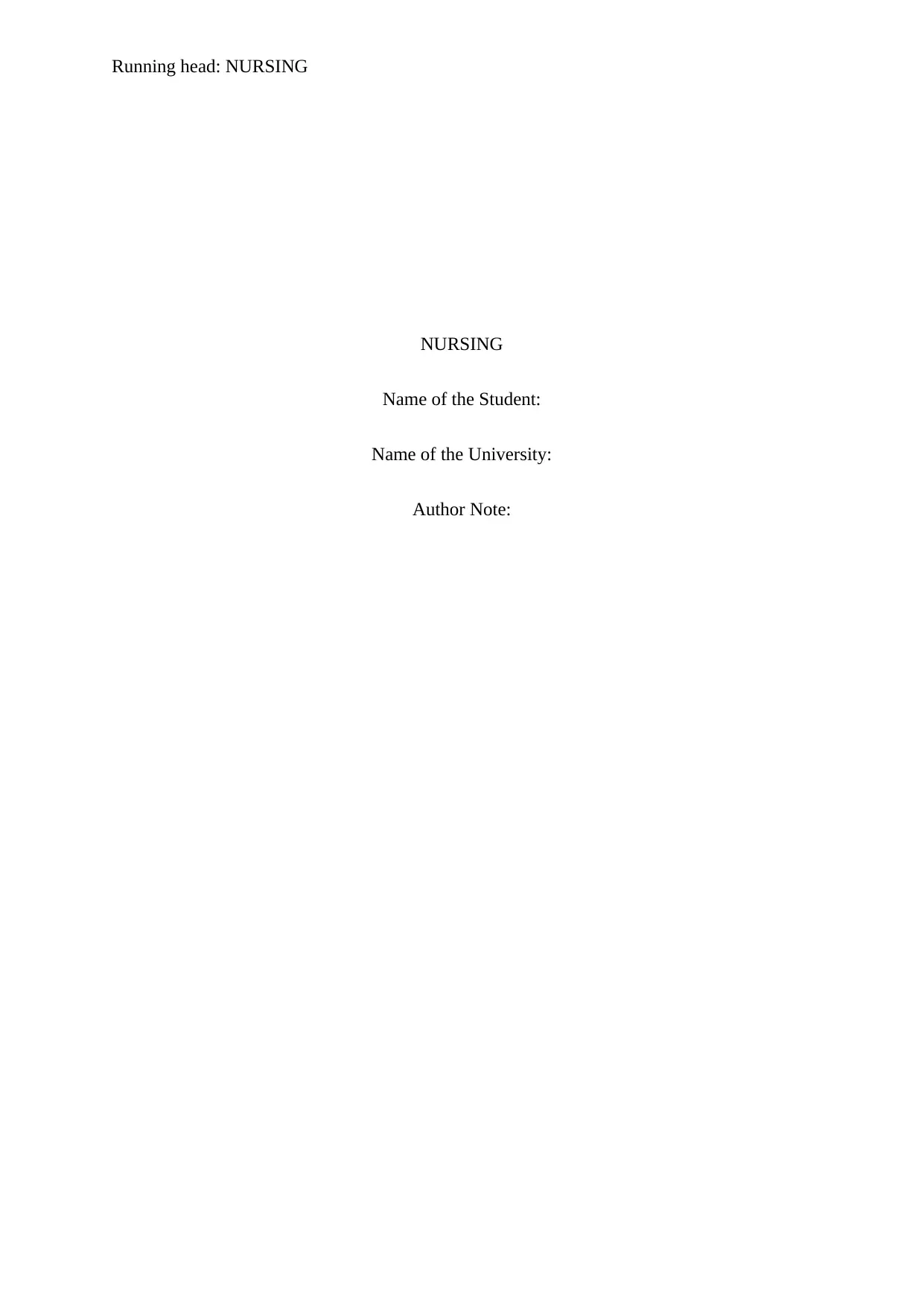
Running head: NURSING
NURSING
Name of the Student:
Name of the University:
Author Note:
NURSING
Name of the Student:
Name of the University:
Author Note:
Paraphrase This Document
Need a fresh take? Get an instant paraphrase of this document with our AI Paraphraser
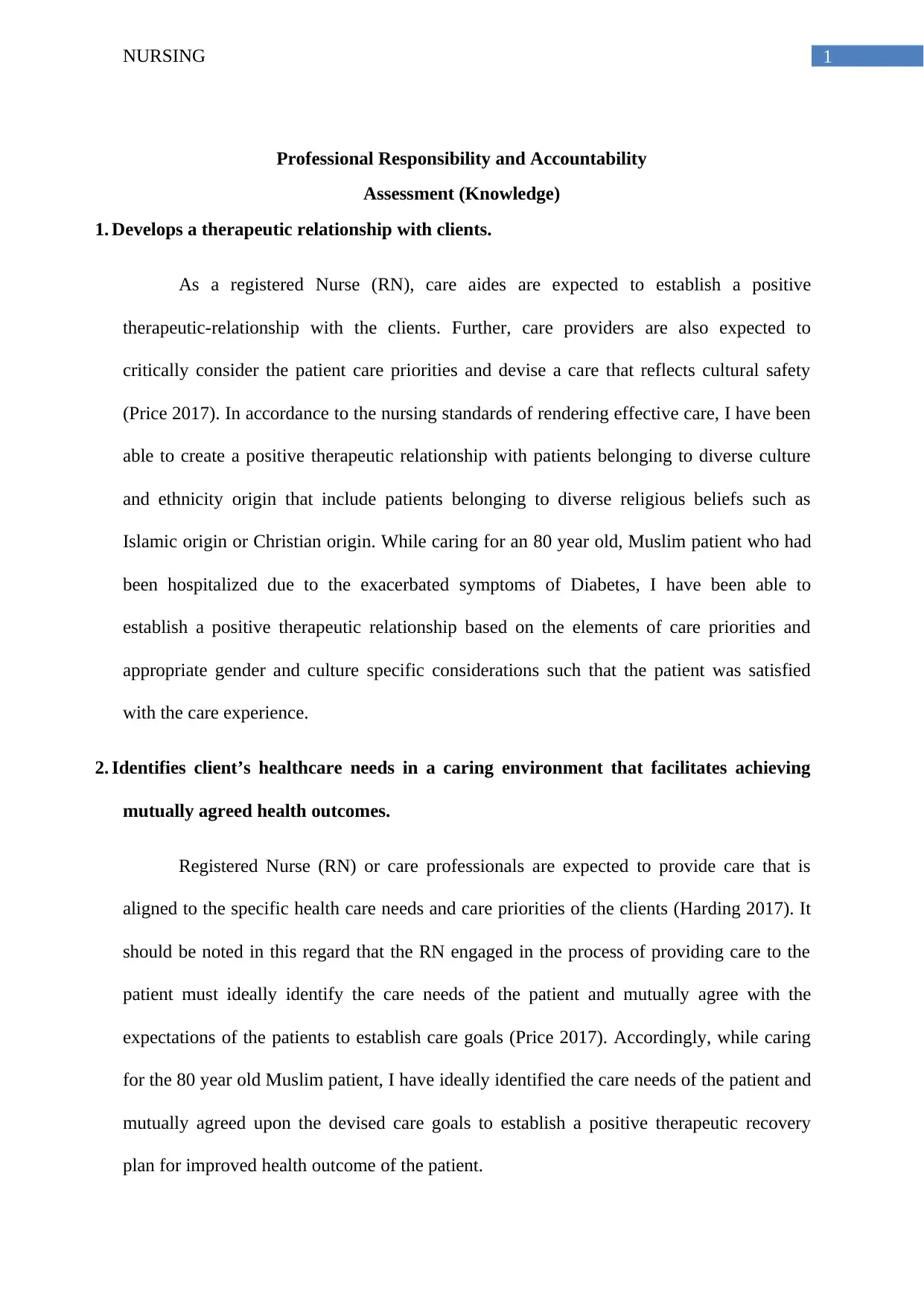
1NURSING
Professional Responsibility and Accountability
Assessment (Knowledge)
1. Develops a therapeutic relationship with clients.
As a registered Nurse (RN), care aides are expected to establish a positive
therapeutic-relationship with the clients. Further, care providers are also expected to
critically consider the patient care priorities and devise a care that reflects cultural safety
(Price 2017). In accordance to the nursing standards of rendering effective care, I have been
able to create a positive therapeutic relationship with patients belonging to diverse culture
and ethnicity origin that include patients belonging to diverse religious beliefs such as
Islamic origin or Christian origin. While caring for an 80 year old, Muslim patient who had
been hospitalized due to the exacerbated symptoms of Diabetes, I have been able to
establish a positive therapeutic relationship based on the elements of care priorities and
appropriate gender and culture specific considerations such that the patient was satisfied
with the care experience.
2. Identifies client’s healthcare needs in a caring environment that facilitates achieving
mutually agreed health outcomes.
Registered Nurse (RN) or care professionals are expected to provide care that is
aligned to the specific health care needs and care priorities of the clients (Harding 2017). It
should be noted in this regard that the RN engaged in the process of providing care to the
patient must ideally identify the care needs of the patient and mutually agree with the
expectations of the patients to establish care goals (Price 2017). Accordingly, while caring
for the 80 year old Muslim patient, I have ideally identified the care needs of the patient and
mutually agreed upon the devised care goals to establish a positive therapeutic recovery
plan for improved health outcome of the patient.
Professional Responsibility and Accountability
Assessment (Knowledge)
1. Develops a therapeutic relationship with clients.
As a registered Nurse (RN), care aides are expected to establish a positive
therapeutic-relationship with the clients. Further, care providers are also expected to
critically consider the patient care priorities and devise a care that reflects cultural safety
(Price 2017). In accordance to the nursing standards of rendering effective care, I have been
able to create a positive therapeutic relationship with patients belonging to diverse culture
and ethnicity origin that include patients belonging to diverse religious beliefs such as
Islamic origin or Christian origin. While caring for an 80 year old, Muslim patient who had
been hospitalized due to the exacerbated symptoms of Diabetes, I have been able to
establish a positive therapeutic relationship based on the elements of care priorities and
appropriate gender and culture specific considerations such that the patient was satisfied
with the care experience.
2. Identifies client’s healthcare needs in a caring environment that facilitates achieving
mutually agreed health outcomes.
Registered Nurse (RN) or care professionals are expected to provide care that is
aligned to the specific health care needs and care priorities of the clients (Harding 2017). It
should be noted in this regard that the RN engaged in the process of providing care to the
patient must ideally identify the care needs of the patient and mutually agree with the
expectations of the patients to establish care goals (Price 2017). Accordingly, while caring
for the 80 year old Muslim patient, I have ideally identified the care needs of the patient and
mutually agreed upon the devised care goals to establish a positive therapeutic recovery
plan for improved health outcome of the patient.
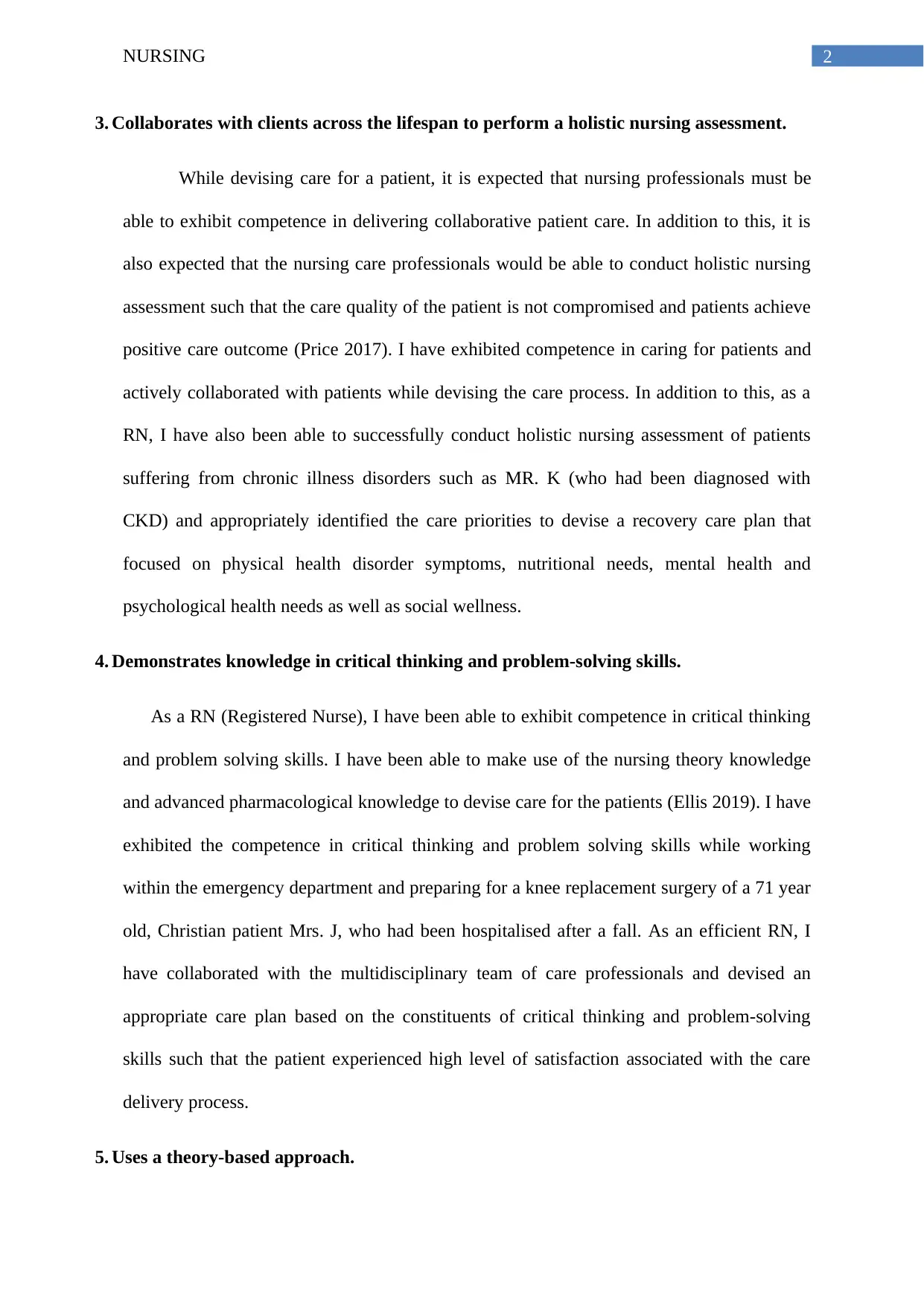
2NURSING
3. Collaborates with clients across the lifespan to perform a holistic nursing assessment.
While devising care for a patient, it is expected that nursing professionals must be
able to exhibit competence in delivering collaborative patient care. In addition to this, it is
also expected that the nursing care professionals would be able to conduct holistic nursing
assessment such that the care quality of the patient is not compromised and patients achieve
positive care outcome (Price 2017). I have exhibited competence in caring for patients and
actively collaborated with patients while devising the care process. In addition to this, as a
RN, I have also been able to successfully conduct holistic nursing assessment of patients
suffering from chronic illness disorders such as MR. K (who had been diagnosed with
CKD) and appropriately identified the care priorities to devise a recovery care plan that
focused on physical health disorder symptoms, nutritional needs, mental health and
psychological health needs as well as social wellness.
4. Demonstrates knowledge in critical thinking and problem-solving skills.
As a RN (Registered Nurse), I have been able to exhibit competence in critical thinking
and problem solving skills. I have been able to make use of the nursing theory knowledge
and advanced pharmacological knowledge to devise care for the patients (Ellis 2019). I have
exhibited the competence in critical thinking and problem solving skills while working
within the emergency department and preparing for a knee replacement surgery of a 71 year
old, Christian patient Mrs. J, who had been hospitalised after a fall. As an efficient RN, I
have collaborated with the multidisciplinary team of care professionals and devised an
appropriate care plan based on the constituents of critical thinking and problem-solving
skills such that the patient experienced high level of satisfaction associated with the care
delivery process.
5. Uses a theory-based approach.
3. Collaborates with clients across the lifespan to perform a holistic nursing assessment.
While devising care for a patient, it is expected that nursing professionals must be
able to exhibit competence in delivering collaborative patient care. In addition to this, it is
also expected that the nursing care professionals would be able to conduct holistic nursing
assessment such that the care quality of the patient is not compromised and patients achieve
positive care outcome (Price 2017). I have exhibited competence in caring for patients and
actively collaborated with patients while devising the care process. In addition to this, as a
RN, I have also been able to successfully conduct holistic nursing assessment of patients
suffering from chronic illness disorders such as MR. K (who had been diagnosed with
CKD) and appropriately identified the care priorities to devise a recovery care plan that
focused on physical health disorder symptoms, nutritional needs, mental health and
psychological health needs as well as social wellness.
4. Demonstrates knowledge in critical thinking and problem-solving skills.
As a RN (Registered Nurse), I have been able to exhibit competence in critical thinking
and problem solving skills. I have been able to make use of the nursing theory knowledge
and advanced pharmacological knowledge to devise care for the patients (Ellis 2019). I have
exhibited the competence in critical thinking and problem solving skills while working
within the emergency department and preparing for a knee replacement surgery of a 71 year
old, Christian patient Mrs. J, who had been hospitalised after a fall. As an efficient RN, I
have collaborated with the multidisciplinary team of care professionals and devised an
appropriate care plan based on the constituents of critical thinking and problem-solving
skills such that the patient experienced high level of satisfaction associated with the care
delivery process.
5. Uses a theory-based approach.
⊘ This is a preview!⊘
Do you want full access?
Subscribe today to unlock all pages.

Trusted by 1+ million students worldwide
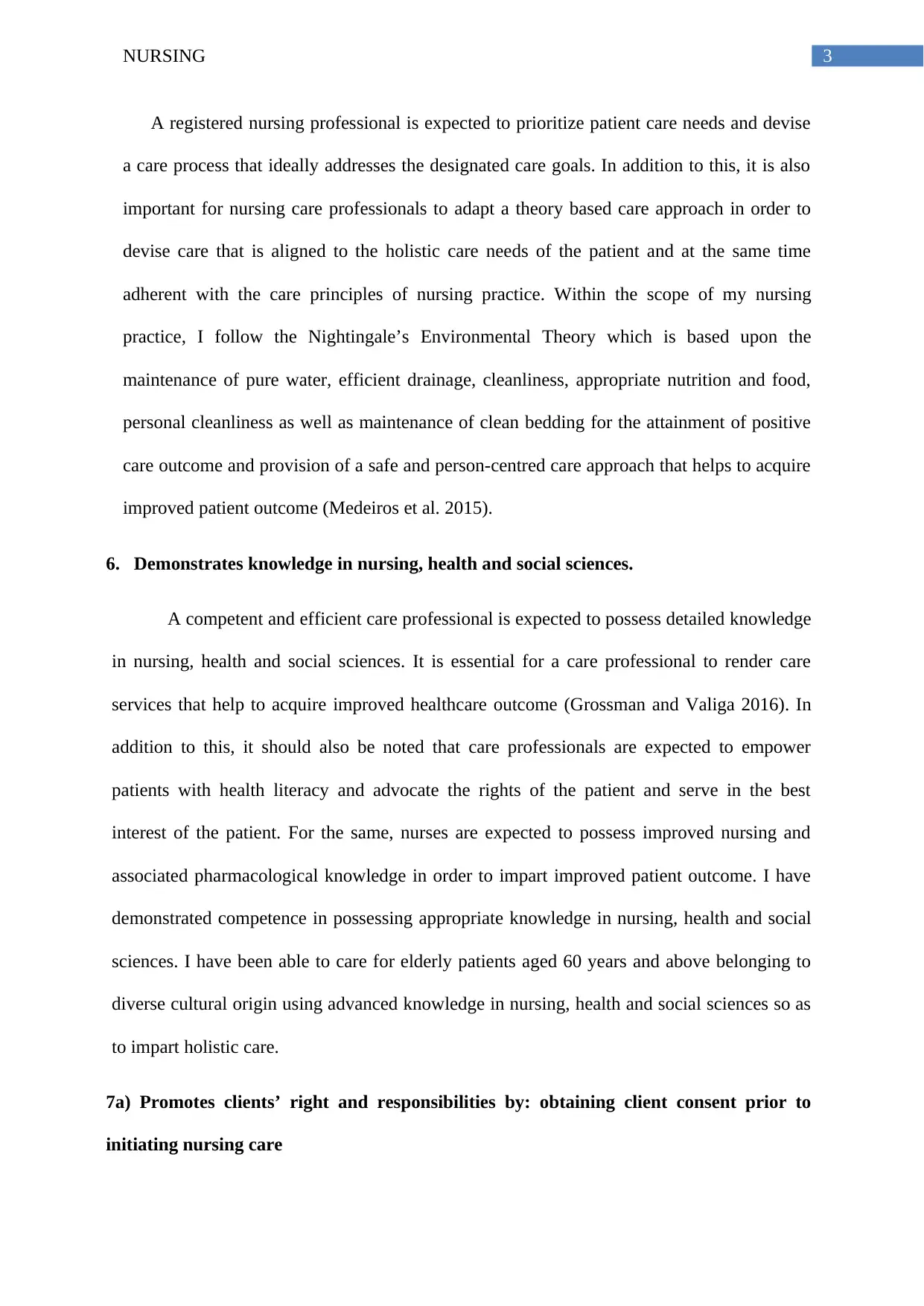
3NURSING
A registered nursing professional is expected to prioritize patient care needs and devise
a care process that ideally addresses the designated care goals. In addition to this, it is also
important for nursing care professionals to adapt a theory based care approach in order to
devise care that is aligned to the holistic care needs of the patient and at the same time
adherent with the care principles of nursing practice. Within the scope of my nursing
practice, I follow the Nightingale’s Environmental Theory which is based upon the
maintenance of pure water, efficient drainage, cleanliness, appropriate nutrition and food,
personal cleanliness as well as maintenance of clean bedding for the attainment of positive
care outcome and provision of a safe and person-centred care approach that helps to acquire
improved patient outcome (Medeiros et al. 2015).
6. Demonstrates knowledge in nursing, health and social sciences.
A competent and efficient care professional is expected to possess detailed knowledge
in nursing, health and social sciences. It is essential for a care professional to render care
services that help to acquire improved healthcare outcome (Grossman and Valiga 2016). In
addition to this, it should also be noted that care professionals are expected to empower
patients with health literacy and advocate the rights of the patient and serve in the best
interest of the patient. For the same, nurses are expected to possess improved nursing and
associated pharmacological knowledge in order to impart improved patient outcome. I have
demonstrated competence in possessing appropriate knowledge in nursing, health and social
sciences. I have been able to care for elderly patients aged 60 years and above belonging to
diverse cultural origin using advanced knowledge in nursing, health and social sciences so as
to impart holistic care.
7a) Promotes clients’ right and responsibilities by: obtaining client consent prior to
initiating nursing care
A registered nursing professional is expected to prioritize patient care needs and devise
a care process that ideally addresses the designated care goals. In addition to this, it is also
important for nursing care professionals to adapt a theory based care approach in order to
devise care that is aligned to the holistic care needs of the patient and at the same time
adherent with the care principles of nursing practice. Within the scope of my nursing
practice, I follow the Nightingale’s Environmental Theory which is based upon the
maintenance of pure water, efficient drainage, cleanliness, appropriate nutrition and food,
personal cleanliness as well as maintenance of clean bedding for the attainment of positive
care outcome and provision of a safe and person-centred care approach that helps to acquire
improved patient outcome (Medeiros et al. 2015).
6. Demonstrates knowledge in nursing, health and social sciences.
A competent and efficient care professional is expected to possess detailed knowledge
in nursing, health and social sciences. It is essential for a care professional to render care
services that help to acquire improved healthcare outcome (Grossman and Valiga 2016). In
addition to this, it should also be noted that care professionals are expected to empower
patients with health literacy and advocate the rights of the patient and serve in the best
interest of the patient. For the same, nurses are expected to possess improved nursing and
associated pharmacological knowledge in order to impart improved patient outcome. I have
demonstrated competence in possessing appropriate knowledge in nursing, health and social
sciences. I have been able to care for elderly patients aged 60 years and above belonging to
diverse cultural origin using advanced knowledge in nursing, health and social sciences so as
to impart holistic care.
7a) Promotes clients’ right and responsibilities by: obtaining client consent prior to
initiating nursing care
Paraphrase This Document
Need a fresh take? Get an instant paraphrase of this document with our AI Paraphraser
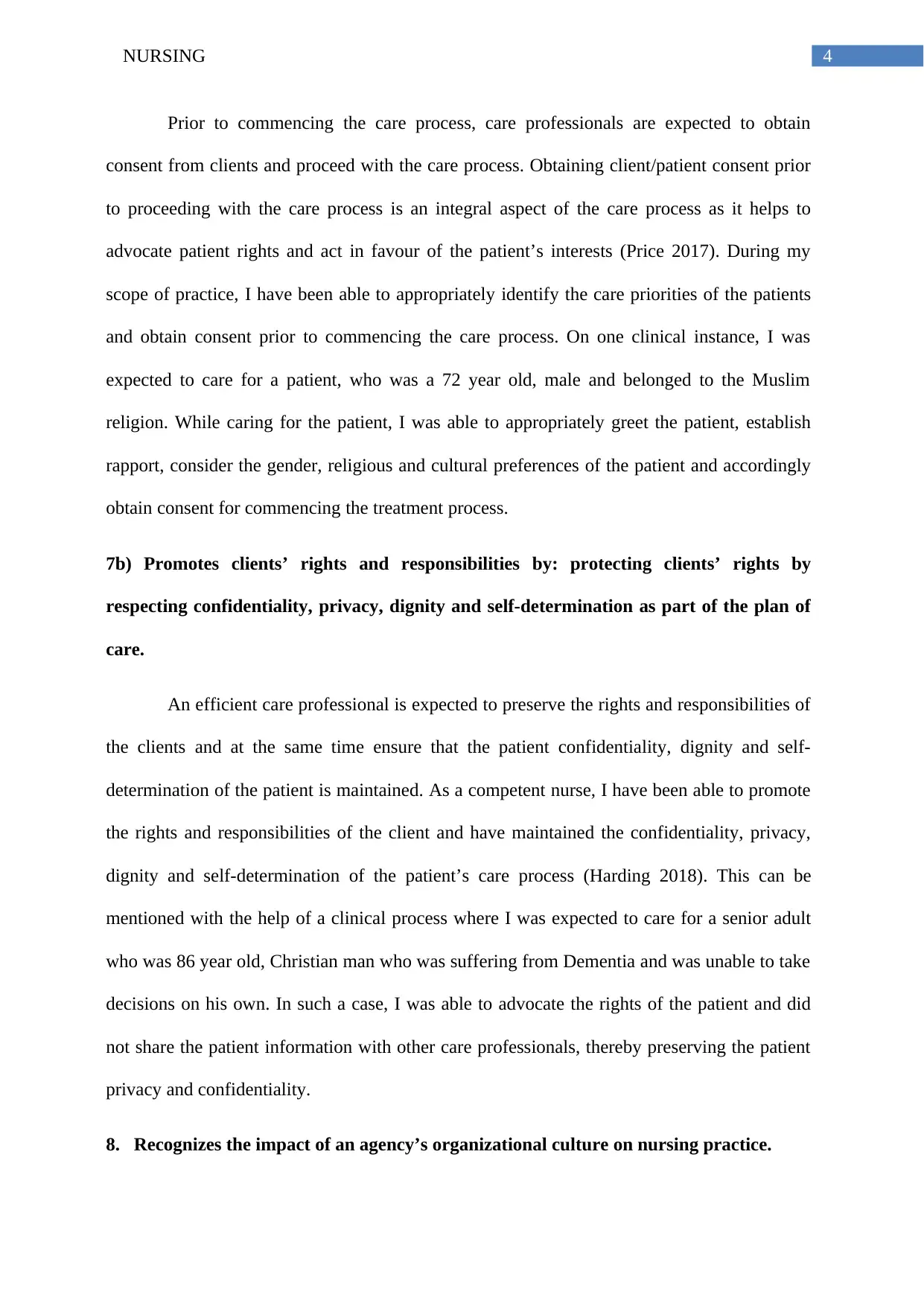
4NURSING
Prior to commencing the care process, care professionals are expected to obtain
consent from clients and proceed with the care process. Obtaining client/patient consent prior
to proceeding with the care process is an integral aspect of the care process as it helps to
advocate patient rights and act in favour of the patient’s interests (Price 2017). During my
scope of practice, I have been able to appropriately identify the care priorities of the patients
and obtain consent prior to commencing the care process. On one clinical instance, I was
expected to care for a patient, who was a 72 year old, male and belonged to the Muslim
religion. While caring for the patient, I was able to appropriately greet the patient, establish
rapport, consider the gender, religious and cultural preferences of the patient and accordingly
obtain consent for commencing the treatment process.
7b) Promotes clients’ rights and responsibilities by: protecting clients’ rights by
respecting confidentiality, privacy, dignity and self-determination as part of the plan of
care.
An efficient care professional is expected to preserve the rights and responsibilities of
the clients and at the same time ensure that the patient confidentiality, dignity and self-
determination of the patient is maintained. As a competent nurse, I have been able to promote
the rights and responsibilities of the client and have maintained the confidentiality, privacy,
dignity and self-determination of the patient’s care process (Harding 2018). This can be
mentioned with the help of a clinical process where I was expected to care for a senior adult
who was 86 year old, Christian man who was suffering from Dementia and was unable to take
decisions on his own. In such a case, I was able to advocate the rights of the patient and did
not share the patient information with other care professionals, thereby preserving the patient
privacy and confidentiality.
8. Recognizes the impact of an agency’s organizational culture on nursing practice.
Prior to commencing the care process, care professionals are expected to obtain
consent from clients and proceed with the care process. Obtaining client/patient consent prior
to proceeding with the care process is an integral aspect of the care process as it helps to
advocate patient rights and act in favour of the patient’s interests (Price 2017). During my
scope of practice, I have been able to appropriately identify the care priorities of the patients
and obtain consent prior to commencing the care process. On one clinical instance, I was
expected to care for a patient, who was a 72 year old, male and belonged to the Muslim
religion. While caring for the patient, I was able to appropriately greet the patient, establish
rapport, consider the gender, religious and cultural preferences of the patient and accordingly
obtain consent for commencing the treatment process.
7b) Promotes clients’ rights and responsibilities by: protecting clients’ rights by
respecting confidentiality, privacy, dignity and self-determination as part of the plan of
care.
An efficient care professional is expected to preserve the rights and responsibilities of
the clients and at the same time ensure that the patient confidentiality, dignity and self-
determination of the patient is maintained. As a competent nurse, I have been able to promote
the rights and responsibilities of the client and have maintained the confidentiality, privacy,
dignity and self-determination of the patient’s care process (Harding 2018). This can be
mentioned with the help of a clinical process where I was expected to care for a senior adult
who was 86 year old, Christian man who was suffering from Dementia and was unable to take
decisions on his own. In such a case, I was able to advocate the rights of the patient and did
not share the patient information with other care professionals, thereby preserving the patient
privacy and confidentiality.
8. Recognizes the impact of an agency’s organizational culture on nursing practice.
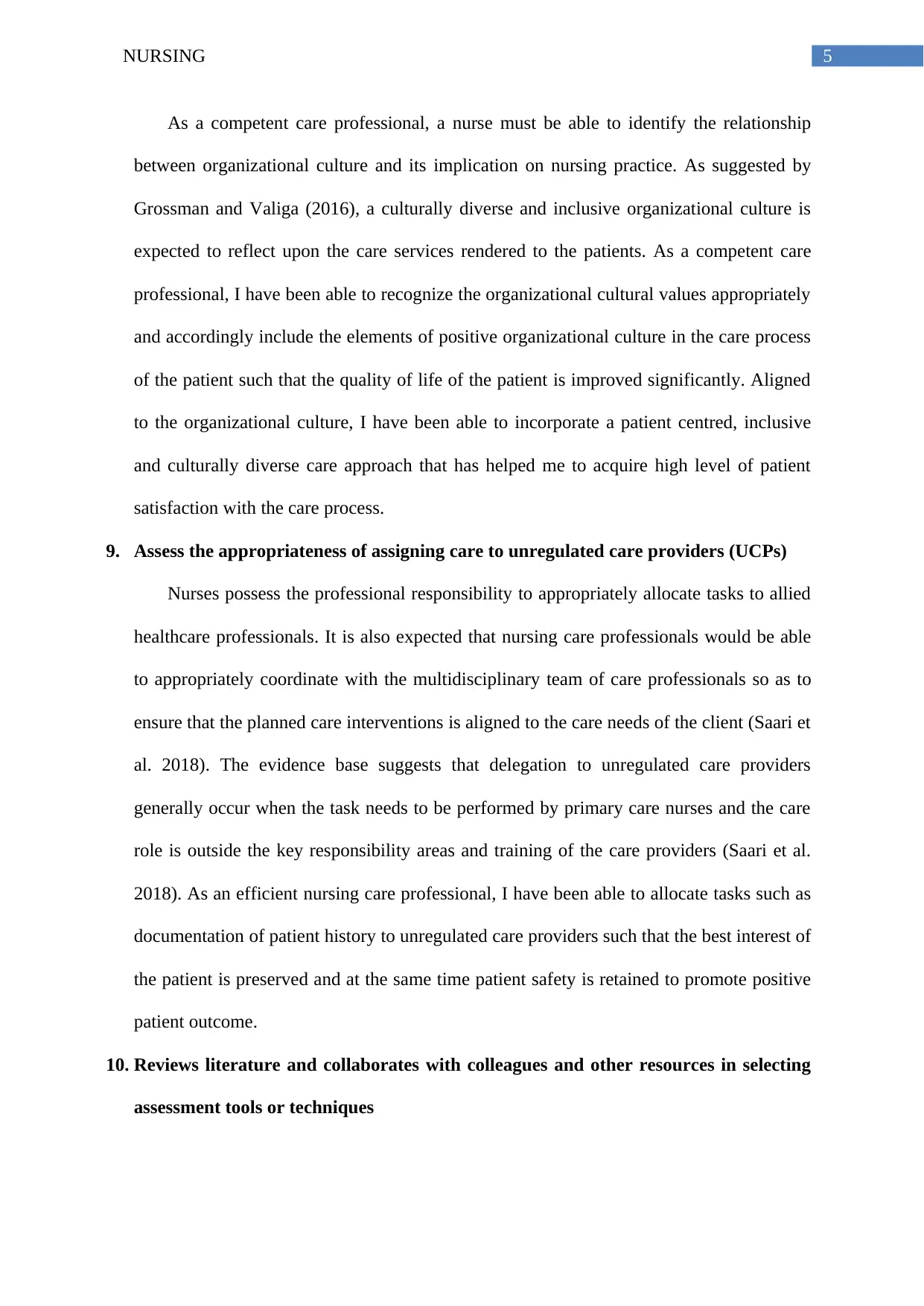
5NURSING
As a competent care professional, a nurse must be able to identify the relationship
between organizational culture and its implication on nursing practice. As suggested by
Grossman and Valiga (2016), a culturally diverse and inclusive organizational culture is
expected to reflect upon the care services rendered to the patients. As a competent care
professional, I have been able to recognize the organizational cultural values appropriately
and accordingly include the elements of positive organizational culture in the care process
of the patient such that the quality of life of the patient is improved significantly. Aligned
to the organizational culture, I have been able to incorporate a patient centred, inclusive
and culturally diverse care approach that has helped me to acquire high level of patient
satisfaction with the care process.
9. Assess the appropriateness of assigning care to unregulated care providers (UCPs)
Nurses possess the professional responsibility to appropriately allocate tasks to allied
healthcare professionals. It is also expected that nursing care professionals would be able
to appropriately coordinate with the multidisciplinary team of care professionals so as to
ensure that the planned care interventions is aligned to the care needs of the client (Saari et
al. 2018). The evidence base suggests that delegation to unregulated care providers
generally occur when the task needs to be performed by primary care nurses and the care
role is outside the key responsibility areas and training of the care providers (Saari et al.
2018). As an efficient nursing care professional, I have been able to allocate tasks such as
documentation of patient history to unregulated care providers such that the best interest of
the patient is preserved and at the same time patient safety is retained to promote positive
patient outcome.
10. Reviews literature and collaborates with colleagues and other resources in selecting
assessment tools or techniques
As a competent care professional, a nurse must be able to identify the relationship
between organizational culture and its implication on nursing practice. As suggested by
Grossman and Valiga (2016), a culturally diverse and inclusive organizational culture is
expected to reflect upon the care services rendered to the patients. As a competent care
professional, I have been able to recognize the organizational cultural values appropriately
and accordingly include the elements of positive organizational culture in the care process
of the patient such that the quality of life of the patient is improved significantly. Aligned
to the organizational culture, I have been able to incorporate a patient centred, inclusive
and culturally diverse care approach that has helped me to acquire high level of patient
satisfaction with the care process.
9. Assess the appropriateness of assigning care to unregulated care providers (UCPs)
Nurses possess the professional responsibility to appropriately allocate tasks to allied
healthcare professionals. It is also expected that nursing care professionals would be able
to appropriately coordinate with the multidisciplinary team of care professionals so as to
ensure that the planned care interventions is aligned to the care needs of the client (Saari et
al. 2018). The evidence base suggests that delegation to unregulated care providers
generally occur when the task needs to be performed by primary care nurses and the care
role is outside the key responsibility areas and training of the care providers (Saari et al.
2018). As an efficient nursing care professional, I have been able to allocate tasks such as
documentation of patient history to unregulated care providers such that the best interest of
the patient is preserved and at the same time patient safety is retained to promote positive
patient outcome.
10. Reviews literature and collaborates with colleagues and other resources in selecting
assessment tools or techniques
⊘ This is a preview!⊘
Do you want full access?
Subscribe today to unlock all pages.

Trusted by 1+ million students worldwide
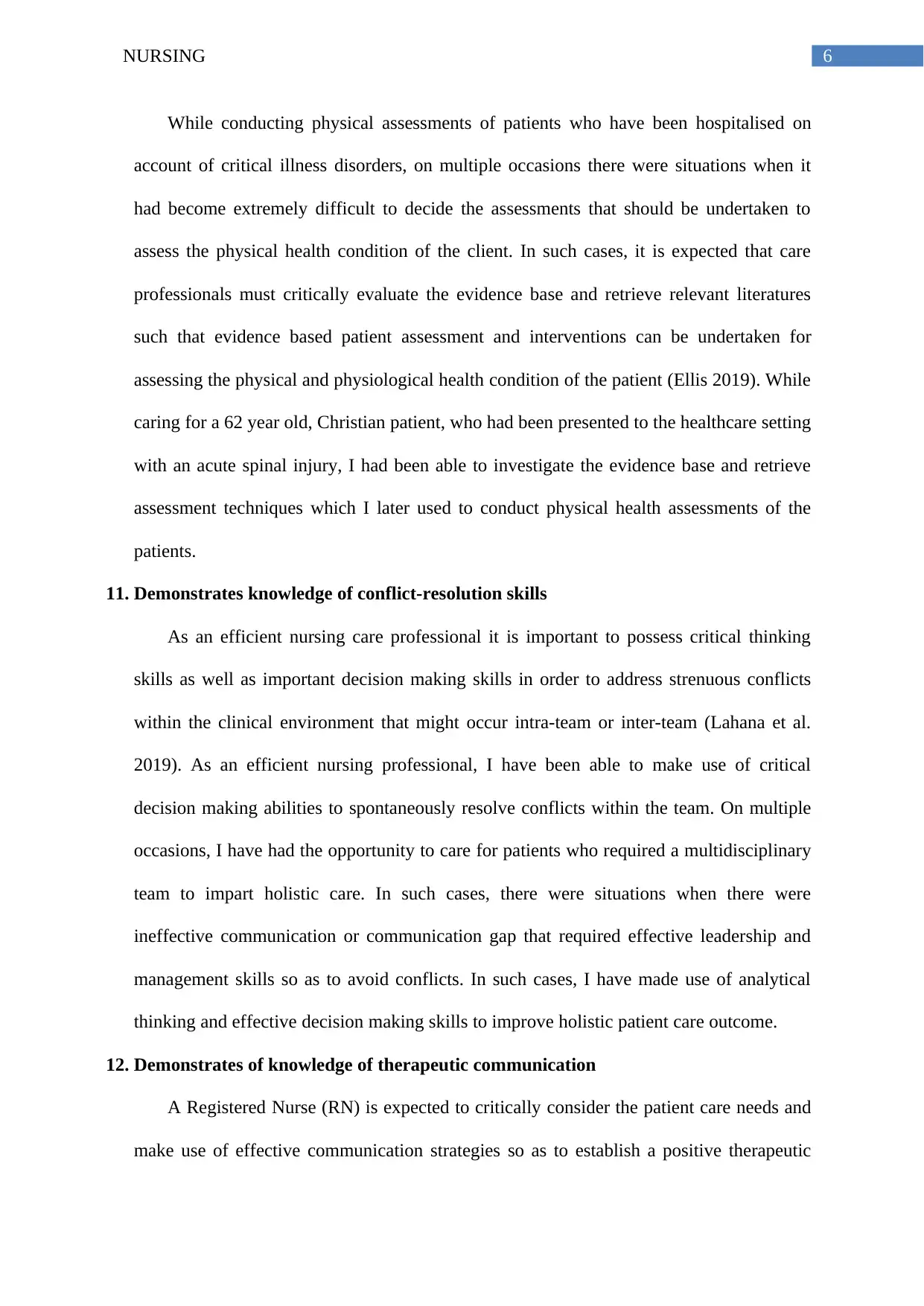
6NURSING
While conducting physical assessments of patients who have been hospitalised on
account of critical illness disorders, on multiple occasions there were situations when it
had become extremely difficult to decide the assessments that should be undertaken to
assess the physical health condition of the client. In such cases, it is expected that care
professionals must critically evaluate the evidence base and retrieve relevant literatures
such that evidence based patient assessment and interventions can be undertaken for
assessing the physical and physiological health condition of the patient (Ellis 2019). While
caring for a 62 year old, Christian patient, who had been presented to the healthcare setting
with an acute spinal injury, I had been able to investigate the evidence base and retrieve
assessment techniques which I later used to conduct physical health assessments of the
patients.
11. Demonstrates knowledge of conflict-resolution skills
As an efficient nursing care professional it is important to possess critical thinking
skills as well as important decision making skills in order to address strenuous conflicts
within the clinical environment that might occur intra-team or inter-team (Lahana et al.
2019). As an efficient nursing professional, I have been able to make use of critical
decision making abilities to spontaneously resolve conflicts within the team. On multiple
occasions, I have had the opportunity to care for patients who required a multidisciplinary
team to impart holistic care. In such cases, there were situations when there were
ineffective communication or communication gap that required effective leadership and
management skills so as to avoid conflicts. In such cases, I have made use of analytical
thinking and effective decision making skills to improve holistic patient care outcome.
12. Demonstrates of knowledge of therapeutic communication
A Registered Nurse (RN) is expected to critically consider the patient care needs and
make use of effective communication strategies so as to establish a positive therapeutic
While conducting physical assessments of patients who have been hospitalised on
account of critical illness disorders, on multiple occasions there were situations when it
had become extremely difficult to decide the assessments that should be undertaken to
assess the physical health condition of the client. In such cases, it is expected that care
professionals must critically evaluate the evidence base and retrieve relevant literatures
such that evidence based patient assessment and interventions can be undertaken for
assessing the physical and physiological health condition of the patient (Ellis 2019). While
caring for a 62 year old, Christian patient, who had been presented to the healthcare setting
with an acute spinal injury, I had been able to investigate the evidence base and retrieve
assessment techniques which I later used to conduct physical health assessments of the
patients.
11. Demonstrates knowledge of conflict-resolution skills
As an efficient nursing care professional it is important to possess critical thinking
skills as well as important decision making skills in order to address strenuous conflicts
within the clinical environment that might occur intra-team or inter-team (Lahana et al.
2019). As an efficient nursing professional, I have been able to make use of critical
decision making abilities to spontaneously resolve conflicts within the team. On multiple
occasions, I have had the opportunity to care for patients who required a multidisciplinary
team to impart holistic care. In such cases, there were situations when there were
ineffective communication or communication gap that required effective leadership and
management skills so as to avoid conflicts. In such cases, I have made use of analytical
thinking and effective decision making skills to improve holistic patient care outcome.
12. Demonstrates of knowledge of therapeutic communication
A Registered Nurse (RN) is expected to critically consider the patient care needs and
make use of effective communication strategies so as to establish a positive therapeutic
Paraphrase This Document
Need a fresh take? Get an instant paraphrase of this document with our AI Paraphraser
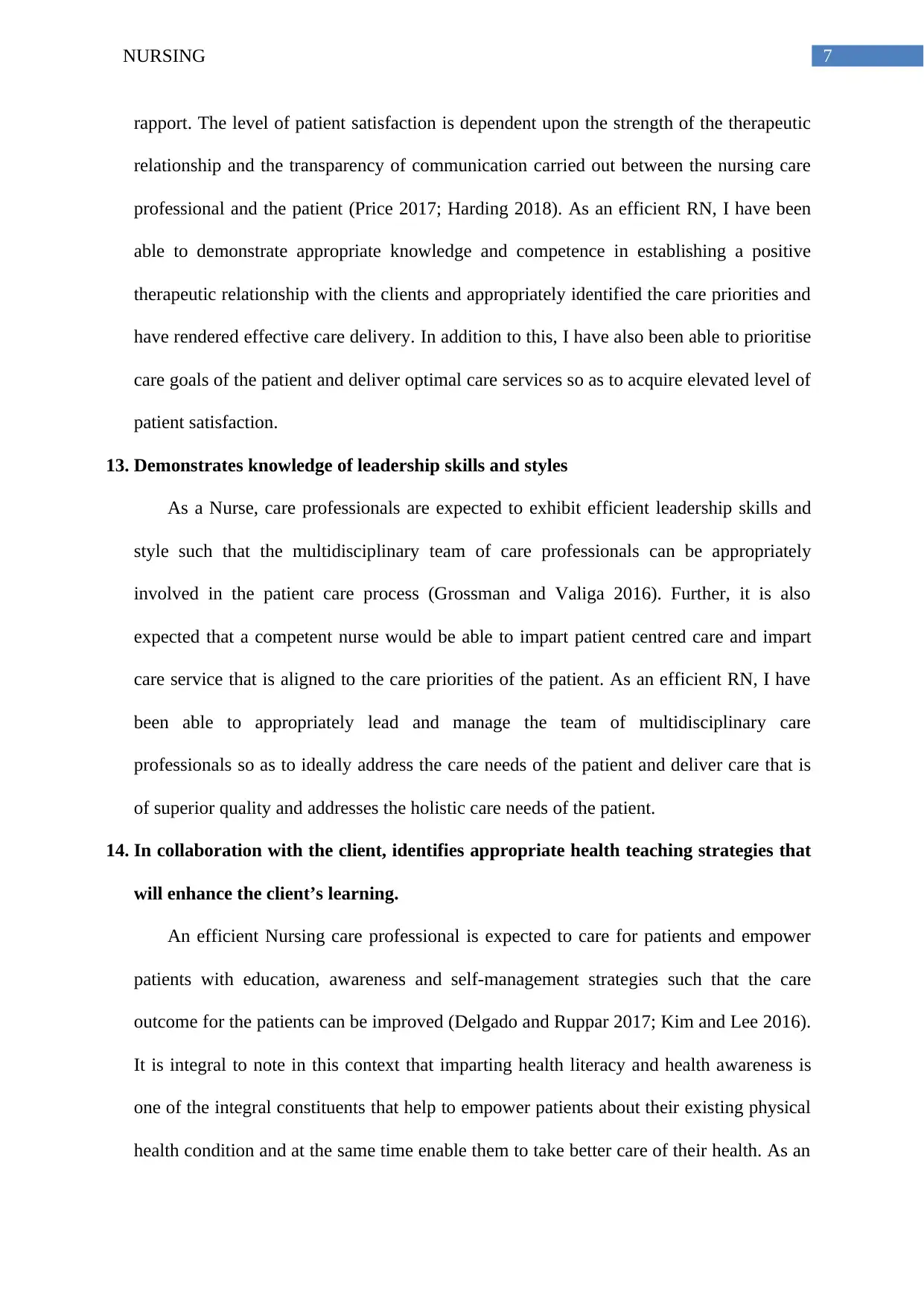
7NURSING
rapport. The level of patient satisfaction is dependent upon the strength of the therapeutic
relationship and the transparency of communication carried out between the nursing care
professional and the patient (Price 2017; Harding 2018). As an efficient RN, I have been
able to demonstrate appropriate knowledge and competence in establishing a positive
therapeutic relationship with the clients and appropriately identified the care priorities and
have rendered effective care delivery. In addition to this, I have also been able to prioritise
care goals of the patient and deliver optimal care services so as to acquire elevated level of
patient satisfaction.
13. Demonstrates knowledge of leadership skills and styles
As a Nurse, care professionals are expected to exhibit efficient leadership skills and
style such that the multidisciplinary team of care professionals can be appropriately
involved in the patient care process (Grossman and Valiga 2016). Further, it is also
expected that a competent nurse would be able to impart patient centred care and impart
care service that is aligned to the care priorities of the patient. As an efficient RN, I have
been able to appropriately lead and manage the team of multidisciplinary care
professionals so as to ideally address the care needs of the patient and deliver care that is
of superior quality and addresses the holistic care needs of the patient.
14. In collaboration with the client, identifies appropriate health teaching strategies that
will enhance the client’s learning.
An efficient Nursing care professional is expected to care for patients and empower
patients with education, awareness and self-management strategies such that the care
outcome for the patients can be improved (Delgado and Ruppar 2017; Kim and Lee 2016).
It is integral to note in this context that imparting health literacy and health awareness is
one of the integral constituents that help to empower patients about their existing physical
health condition and at the same time enable them to take better care of their health. As an
rapport. The level of patient satisfaction is dependent upon the strength of the therapeutic
relationship and the transparency of communication carried out between the nursing care
professional and the patient (Price 2017; Harding 2018). As an efficient RN, I have been
able to demonstrate appropriate knowledge and competence in establishing a positive
therapeutic relationship with the clients and appropriately identified the care priorities and
have rendered effective care delivery. In addition to this, I have also been able to prioritise
care goals of the patient and deliver optimal care services so as to acquire elevated level of
patient satisfaction.
13. Demonstrates knowledge of leadership skills and styles
As a Nurse, care professionals are expected to exhibit efficient leadership skills and
style such that the multidisciplinary team of care professionals can be appropriately
involved in the patient care process (Grossman and Valiga 2016). Further, it is also
expected that a competent nurse would be able to impart patient centred care and impart
care service that is aligned to the care priorities of the patient. As an efficient RN, I have
been able to appropriately lead and manage the team of multidisciplinary care
professionals so as to ideally address the care needs of the patient and deliver care that is
of superior quality and addresses the holistic care needs of the patient.
14. In collaboration with the client, identifies appropriate health teaching strategies that
will enhance the client’s learning.
An efficient Nursing care professional is expected to care for patients and empower
patients with education, awareness and self-management strategies such that the care
outcome for the patients can be improved (Delgado and Ruppar 2017; Kim and Lee 2016).
It is integral to note in this context that imparting health literacy and health awareness is
one of the integral constituents that help to empower patients about their existing physical
health condition and at the same time enable them to take better care of their health. As an
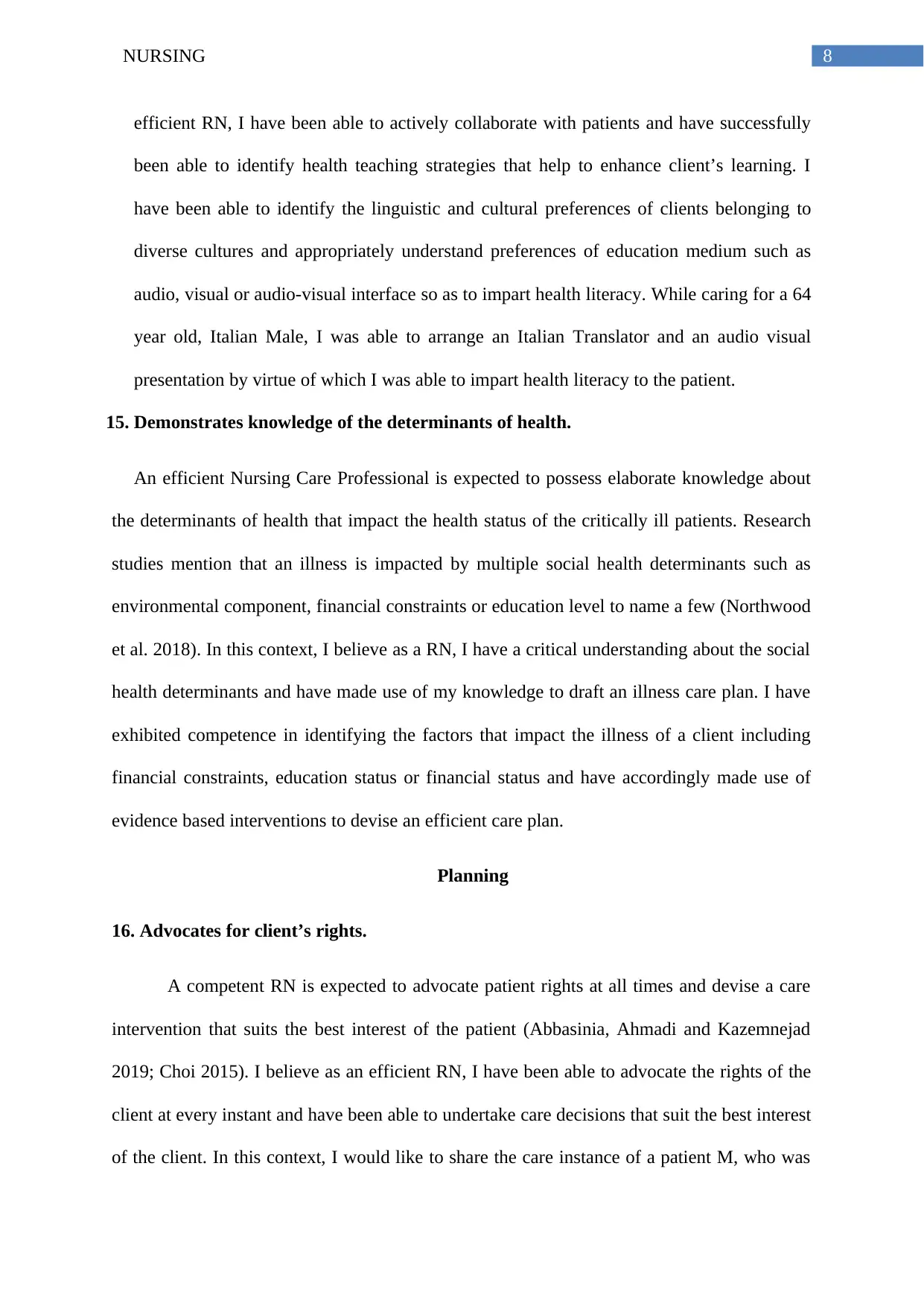
8NURSING
efficient RN, I have been able to actively collaborate with patients and have successfully
been able to identify health teaching strategies that help to enhance client’s learning. I
have been able to identify the linguistic and cultural preferences of clients belonging to
diverse cultures and appropriately understand preferences of education medium such as
audio, visual or audio-visual interface so as to impart health literacy. While caring for a 64
year old, Italian Male, I was able to arrange an Italian Translator and an audio visual
presentation by virtue of which I was able to impart health literacy to the patient.
15. Demonstrates knowledge of the determinants of health.
An efficient Nursing Care Professional is expected to possess elaborate knowledge about
the determinants of health that impact the health status of the critically ill patients. Research
studies mention that an illness is impacted by multiple social health determinants such as
environmental component, financial constraints or education level to name a few (Northwood
et al. 2018). In this context, I believe as a RN, I have a critical understanding about the social
health determinants and have made use of my knowledge to draft an illness care plan. I have
exhibited competence in identifying the factors that impact the illness of a client including
financial constraints, education status or financial status and have accordingly made use of
evidence based interventions to devise an efficient care plan.
Planning
16. Advocates for client’s rights.
A competent RN is expected to advocate patient rights at all times and devise a care
intervention that suits the best interest of the patient (Abbasinia, Ahmadi and Kazemnejad
2019; Choi 2015). I believe as an efficient RN, I have been able to advocate the rights of the
client at every instant and have been able to undertake care decisions that suit the best interest
of the client. In this context, I would like to share the care instance of a patient M, who was
efficient RN, I have been able to actively collaborate with patients and have successfully
been able to identify health teaching strategies that help to enhance client’s learning. I
have been able to identify the linguistic and cultural preferences of clients belonging to
diverse cultures and appropriately understand preferences of education medium such as
audio, visual or audio-visual interface so as to impart health literacy. While caring for a 64
year old, Italian Male, I was able to arrange an Italian Translator and an audio visual
presentation by virtue of which I was able to impart health literacy to the patient.
15. Demonstrates knowledge of the determinants of health.
An efficient Nursing Care Professional is expected to possess elaborate knowledge about
the determinants of health that impact the health status of the critically ill patients. Research
studies mention that an illness is impacted by multiple social health determinants such as
environmental component, financial constraints or education level to name a few (Northwood
et al. 2018). In this context, I believe as a RN, I have a critical understanding about the social
health determinants and have made use of my knowledge to draft an illness care plan. I have
exhibited competence in identifying the factors that impact the illness of a client including
financial constraints, education status or financial status and have accordingly made use of
evidence based interventions to devise an efficient care plan.
Planning
16. Advocates for client’s rights.
A competent RN is expected to advocate patient rights at all times and devise a care
intervention that suits the best interest of the patient (Abbasinia, Ahmadi and Kazemnejad
2019; Choi 2015). I believe as an efficient RN, I have been able to advocate the rights of the
client at every instant and have been able to undertake care decisions that suit the best interest
of the client. In this context, I would like to share the care instance of a patient M, who was
⊘ This is a preview!⊘
Do you want full access?
Subscribe today to unlock all pages.

Trusted by 1+ million students worldwide
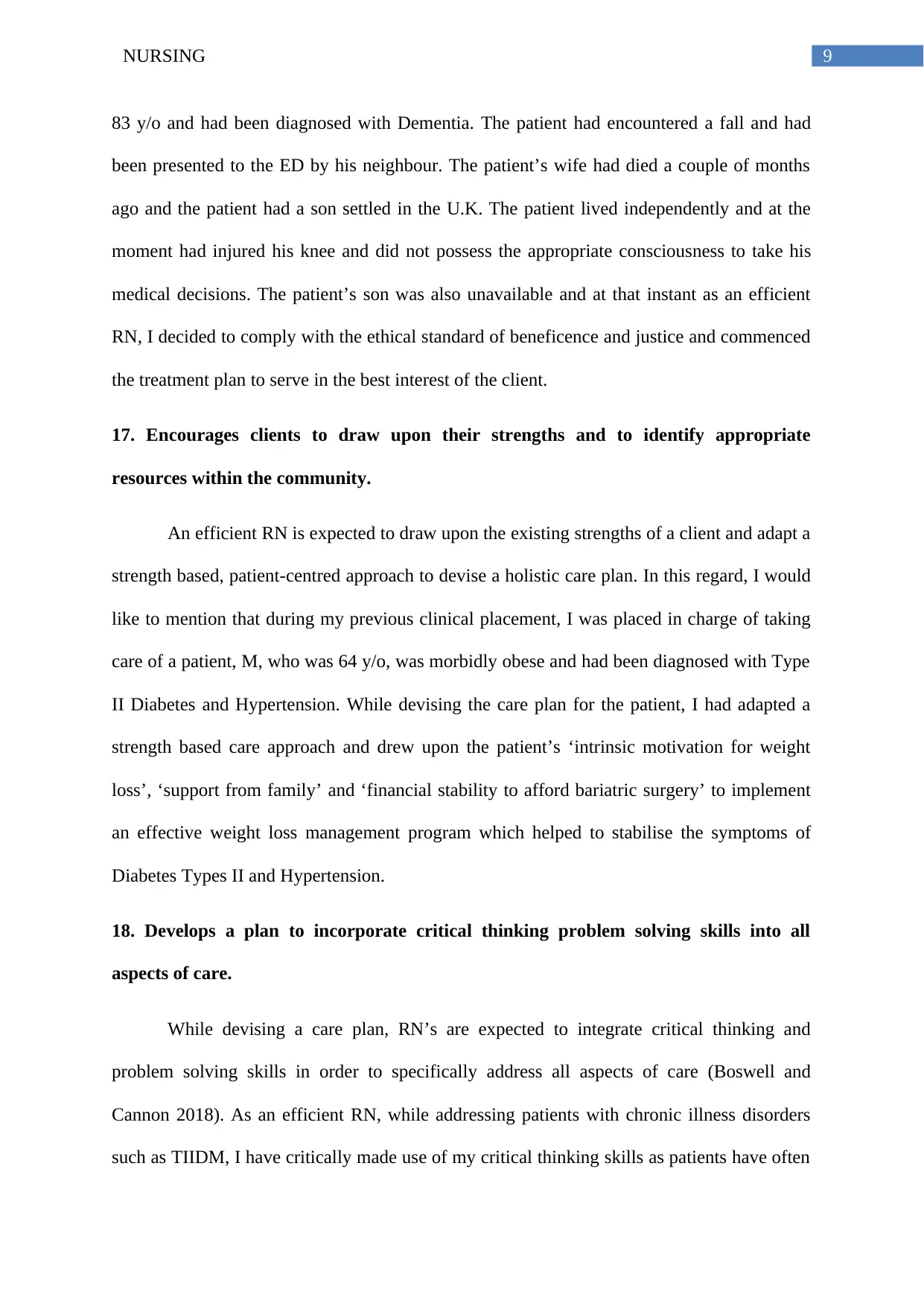
9NURSING
83 y/o and had been diagnosed with Dementia. The patient had encountered a fall and had
been presented to the ED by his neighbour. The patient’s wife had died a couple of months
ago and the patient had a son settled in the U.K. The patient lived independently and at the
moment had injured his knee and did not possess the appropriate consciousness to take his
medical decisions. The patient’s son was also unavailable and at that instant as an efficient
RN, I decided to comply with the ethical standard of beneficence and justice and commenced
the treatment plan to serve in the best interest of the client.
17. Encourages clients to draw upon their strengths and to identify appropriate
resources within the community.
An efficient RN is expected to draw upon the existing strengths of a client and adapt a
strength based, patient-centred approach to devise a holistic care plan. In this regard, I would
like to mention that during my previous clinical placement, I was placed in charge of taking
care of a patient, M, who was 64 y/o, was morbidly obese and had been diagnosed with Type
II Diabetes and Hypertension. While devising the care plan for the patient, I had adapted a
strength based care approach and drew upon the patient’s ‘intrinsic motivation for weight
loss’, ‘support from family’ and ‘financial stability to afford bariatric surgery’ to implement
an effective weight loss management program which helped to stabilise the symptoms of
Diabetes Types II and Hypertension.
18. Develops a plan to incorporate critical thinking problem solving skills into all
aspects of care.
While devising a care plan, RN’s are expected to integrate critical thinking and
problem solving skills in order to specifically address all aspects of care (Boswell and
Cannon 2018). As an efficient RN, while addressing patients with chronic illness disorders
such as TIIDM, I have critically made use of my critical thinking skills as patients have often
83 y/o and had been diagnosed with Dementia. The patient had encountered a fall and had
been presented to the ED by his neighbour. The patient’s wife had died a couple of months
ago and the patient had a son settled in the U.K. The patient lived independently and at the
moment had injured his knee and did not possess the appropriate consciousness to take his
medical decisions. The patient’s son was also unavailable and at that instant as an efficient
RN, I decided to comply with the ethical standard of beneficence and justice and commenced
the treatment plan to serve in the best interest of the client.
17. Encourages clients to draw upon their strengths and to identify appropriate
resources within the community.
An efficient RN is expected to draw upon the existing strengths of a client and adapt a
strength based, patient-centred approach to devise a holistic care plan. In this regard, I would
like to mention that during my previous clinical placement, I was placed in charge of taking
care of a patient, M, who was 64 y/o, was morbidly obese and had been diagnosed with Type
II Diabetes and Hypertension. While devising the care plan for the patient, I had adapted a
strength based care approach and drew upon the patient’s ‘intrinsic motivation for weight
loss’, ‘support from family’ and ‘financial stability to afford bariatric surgery’ to implement
an effective weight loss management program which helped to stabilise the symptoms of
Diabetes Types II and Hypertension.
18. Develops a plan to incorporate critical thinking problem solving skills into all
aspects of care.
While devising a care plan, RN’s are expected to integrate critical thinking and
problem solving skills in order to specifically address all aspects of care (Boswell and
Cannon 2018). As an efficient RN, while addressing patients with chronic illness disorders
such as TIIDM, I have critically made use of my critical thinking skills as patients have often
Paraphrase This Document
Need a fresh take? Get an instant paraphrase of this document with our AI Paraphraser
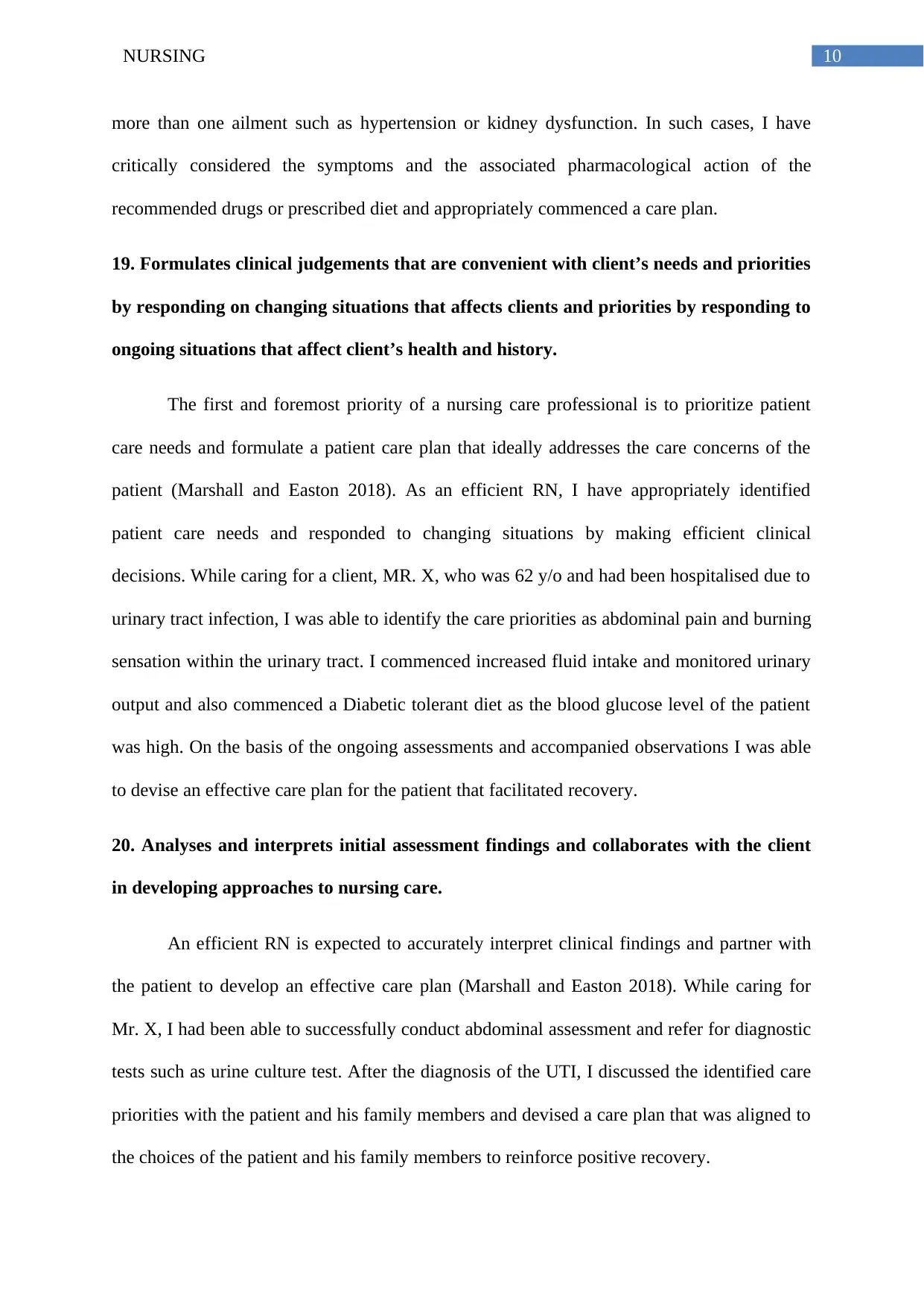
10NURSING
more than one ailment such as hypertension or kidney dysfunction. In such cases, I have
critically considered the symptoms and the associated pharmacological action of the
recommended drugs or prescribed diet and appropriately commenced a care plan.
19. Formulates clinical judgements that are convenient with client’s needs and priorities
by responding on changing situations that affects clients and priorities by responding to
ongoing situations that affect client’s health and history.
The first and foremost priority of a nursing care professional is to prioritize patient
care needs and formulate a patient care plan that ideally addresses the care concerns of the
patient (Marshall and Easton 2018). As an efficient RN, I have appropriately identified
patient care needs and responded to changing situations by making efficient clinical
decisions. While caring for a client, MR. X, who was 62 y/o and had been hospitalised due to
urinary tract infection, I was able to identify the care priorities as abdominal pain and burning
sensation within the urinary tract. I commenced increased fluid intake and monitored urinary
output and also commenced a Diabetic tolerant diet as the blood glucose level of the patient
was high. On the basis of the ongoing assessments and accompanied observations I was able
to devise an effective care plan for the patient that facilitated recovery.
20. Analyses and interprets initial assessment findings and collaborates with the client
in developing approaches to nursing care.
An efficient RN is expected to accurately interpret clinical findings and partner with
the patient to develop an effective care plan (Marshall and Easton 2018). While caring for
Mr. X, I had been able to successfully conduct abdominal assessment and refer for diagnostic
tests such as urine culture test. After the diagnosis of the UTI, I discussed the identified care
priorities with the patient and his family members and devised a care plan that was aligned to
the choices of the patient and his family members to reinforce positive recovery.
more than one ailment such as hypertension or kidney dysfunction. In such cases, I have
critically considered the symptoms and the associated pharmacological action of the
recommended drugs or prescribed diet and appropriately commenced a care plan.
19. Formulates clinical judgements that are convenient with client’s needs and priorities
by responding on changing situations that affects clients and priorities by responding to
ongoing situations that affect client’s health and history.
The first and foremost priority of a nursing care professional is to prioritize patient
care needs and formulate a patient care plan that ideally addresses the care concerns of the
patient (Marshall and Easton 2018). As an efficient RN, I have appropriately identified
patient care needs and responded to changing situations by making efficient clinical
decisions. While caring for a client, MR. X, who was 62 y/o and had been hospitalised due to
urinary tract infection, I was able to identify the care priorities as abdominal pain and burning
sensation within the urinary tract. I commenced increased fluid intake and monitored urinary
output and also commenced a Diabetic tolerant diet as the blood glucose level of the patient
was high. On the basis of the ongoing assessments and accompanied observations I was able
to devise an effective care plan for the patient that facilitated recovery.
20. Analyses and interprets initial assessment findings and collaborates with the client
in developing approaches to nursing care.
An efficient RN is expected to accurately interpret clinical findings and partner with
the patient to develop an effective care plan (Marshall and Easton 2018). While caring for
Mr. X, I had been able to successfully conduct abdominal assessment and refer for diagnostic
tests such as urine culture test. After the diagnosis of the UTI, I discussed the identified care
priorities with the patient and his family members and devised a care plan that was aligned to
the choices of the patient and his family members to reinforce positive recovery.
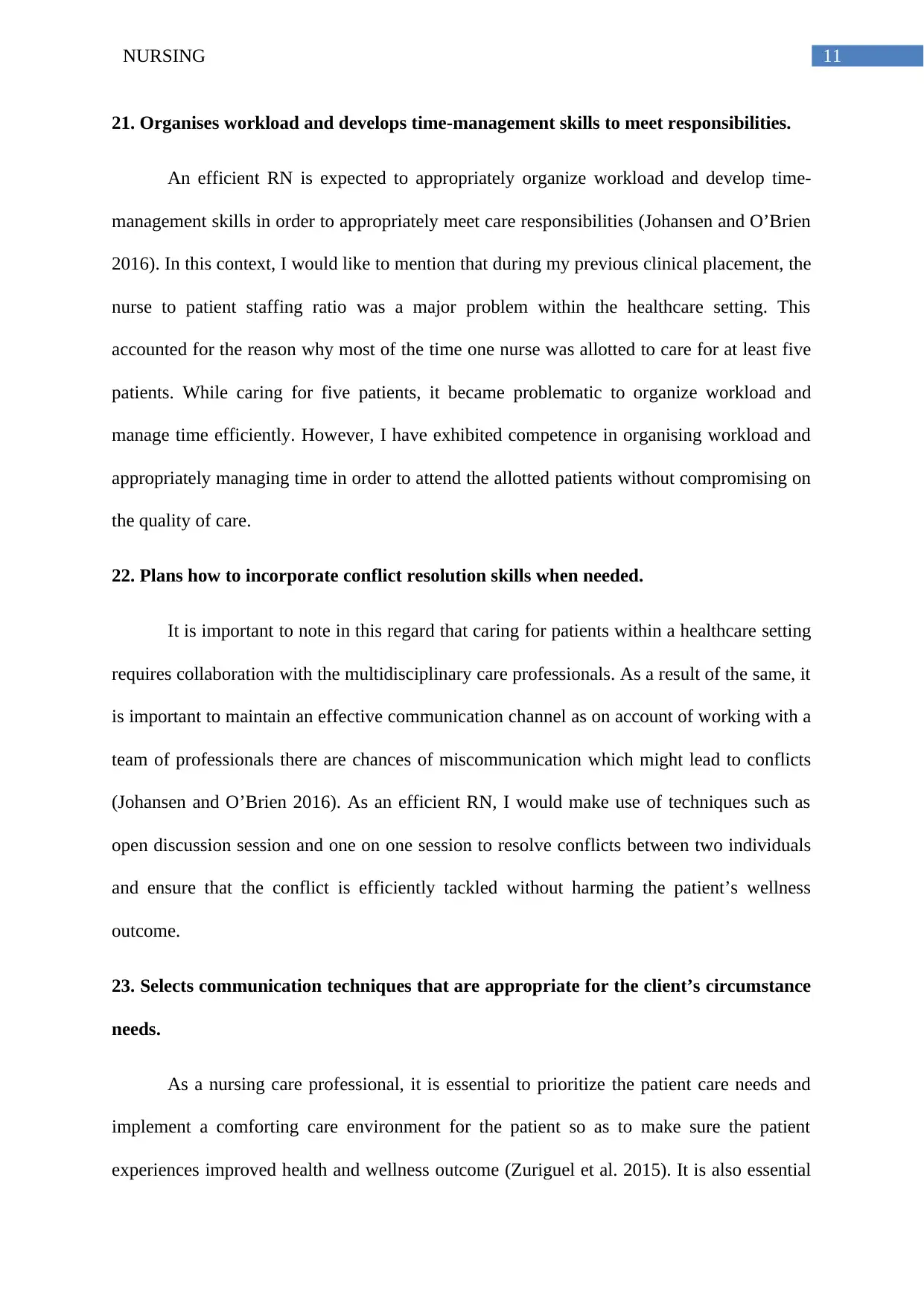
11NURSING
21. Organises workload and develops time-management skills to meet responsibilities.
An efficient RN is expected to appropriately organize workload and develop time-
management skills in order to appropriately meet care responsibilities (Johansen and O’Brien
2016). In this context, I would like to mention that during my previous clinical placement, the
nurse to patient staffing ratio was a major problem within the healthcare setting. This
accounted for the reason why most of the time one nurse was allotted to care for at least five
patients. While caring for five patients, it became problematic to organize workload and
manage time efficiently. However, I have exhibited competence in organising workload and
appropriately managing time in order to attend the allotted patients without compromising on
the quality of care.
22. Plans how to incorporate conflict resolution skills when needed.
It is important to note in this regard that caring for patients within a healthcare setting
requires collaboration with the multidisciplinary care professionals. As a result of the same, it
is important to maintain an effective communication channel as on account of working with a
team of professionals there are chances of miscommunication which might lead to conflicts
(Johansen and O’Brien 2016). As an efficient RN, I would make use of techniques such as
open discussion session and one on one session to resolve conflicts between two individuals
and ensure that the conflict is efficiently tackled without harming the patient’s wellness
outcome.
23. Selects communication techniques that are appropriate for the client’s circumstance
needs.
As a nursing care professional, it is essential to prioritize the patient care needs and
implement a comforting care environment for the patient so as to make sure the patient
experiences improved health and wellness outcome (Zuriguel et al. 2015). It is also essential
21. Organises workload and develops time-management skills to meet responsibilities.
An efficient RN is expected to appropriately organize workload and develop time-
management skills in order to appropriately meet care responsibilities (Johansen and O’Brien
2016). In this context, I would like to mention that during my previous clinical placement, the
nurse to patient staffing ratio was a major problem within the healthcare setting. This
accounted for the reason why most of the time one nurse was allotted to care for at least five
patients. While caring for five patients, it became problematic to organize workload and
manage time efficiently. However, I have exhibited competence in organising workload and
appropriately managing time in order to attend the allotted patients without compromising on
the quality of care.
22. Plans how to incorporate conflict resolution skills when needed.
It is important to note in this regard that caring for patients within a healthcare setting
requires collaboration with the multidisciplinary care professionals. As a result of the same, it
is important to maintain an effective communication channel as on account of working with a
team of professionals there are chances of miscommunication which might lead to conflicts
(Johansen and O’Brien 2016). As an efficient RN, I would make use of techniques such as
open discussion session and one on one session to resolve conflicts between two individuals
and ensure that the conflict is efficiently tackled without harming the patient’s wellness
outcome.
23. Selects communication techniques that are appropriate for the client’s circumstance
needs.
As a nursing care professional, it is essential to prioritize the patient care needs and
implement a comforting care environment for the patient so as to make sure the patient
experiences improved health and wellness outcome (Zuriguel et al. 2015). It is also essential
⊘ This is a preview!⊘
Do you want full access?
Subscribe today to unlock all pages.

Trusted by 1+ million students worldwide
1 out of 64
Related Documents
Your All-in-One AI-Powered Toolkit for Academic Success.
+13062052269
info@desklib.com
Available 24*7 on WhatsApp / Email
![[object Object]](/_next/static/media/star-bottom.7253800d.svg)
Unlock your academic potential
Copyright © 2020–2026 A2Z Services. All Rights Reserved. Developed and managed by ZUCOL.



